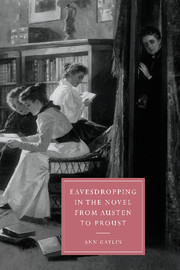Book contents
- Frontmatter
- Contents
- Acknowledgments
- Introduction
- 1 I'm all ears: Pride and Prejudice, or the story behind the story
- 2 Eavesdropping and the gentle art of Persuasion
- 3 Household words: Balzac's and Dickens's domestic spaces
- 4 The madwoman outside the attic: eavesdropping and narrative agency in The Woman in White
- 5 La double entente: eavesdropping and identity in A la recherche du temps perdu
- Conclusion: covert listeners and secret agents
- Notes
- Select bibliography
- Index
Introduction
Published online by Cambridge University Press: 22 September 2009
- Frontmatter
- Contents
- Acknowledgments
- Introduction
- 1 I'm all ears: Pride and Prejudice, or the story behind the story
- 2 Eavesdropping and the gentle art of Persuasion
- 3 Household words: Balzac's and Dickens's domestic spaces
- 4 The madwoman outside the attic: eavesdropping and narrative agency in The Woman in White
- 5 La double entente: eavesdropping and identity in A la recherche du temps perdu
- Conclusion: covert listeners and secret agents
- Notes
- Select bibliography
- Index
Summary
PROLEGOMENA
We all do it, although we deny it. We eavesdrop. Sometimes we listen in on others deliberately, more often inadvertently. Once hooked, we have trouble resisting the urge to listen, particularly if the conversation is interesting. Will she leave her husband? Will he take over the company? Whom does she really love? We try to make sense of what we have heard: we imagine, we plot, we interpret. We continue to eavesdrop.
This book aims to make sense of an activity to which we rarely admit, about which we hardly speculate, yet which has long been represented in fiction. Eavesdropping has existed in the novel as long as the novel has existed. Trained to think, to articulate, and to represent our ideas in visual terms, we tend to ignore the significance of hearing, and overhearing, in narrative. It has been largely overlooked, or, if you will, underheard. Appearing intermittently, eavesdropping dramatizes some of the fundamental issues that inform our hermeneutic and epistemological efforts. A nonconsensual, deceptive activity, it introduces intriguing moral questions about human interaction and subjectivity, since eavesdropping always depends on discovering connections among other people. A secret witness deliberately or unintentionally acquires information about others that may be used to villainous ends or may be kept benignly private. Overhearing affords ample opportunity for private information to become public or for secrets to fall into the wrong hands.
- Type
- Chapter
- Information
- Eavesdropping in the Novel from Austen to Proust , pp. 1 - 25Publisher: Cambridge University PressPrint publication year: 2003
- 1
- Cited by

